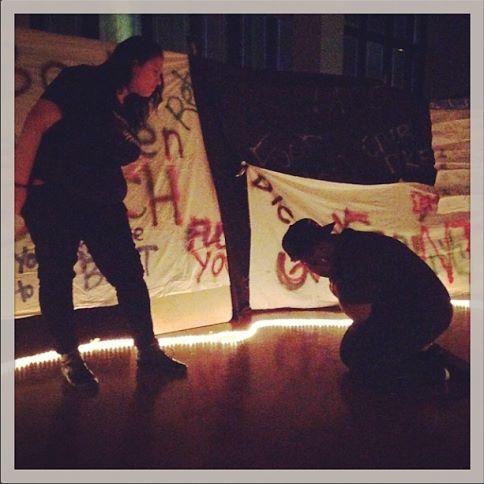
The National Residence Hall Honorary’s (NRHH) annually held event, “Tunnel of Oppression,” has been canceled this semester due to withdrawal of support from the Psychological Counseling Center (PCC).
Tunnel of Oppression is designed to introduce students to the concept of oppression and the different forms it can take. The event immerses students in different scenes of oppression in order to educate them about oppressive aspects in our society, according to NRHH Campus President Steven Sullivan. Educating those within the New Paltz student body who have not experienced oppression is the primary benefit of the event, Sullivan said.
PCC withdrew their support two weeks before the event was supposed to be held, on Nov. 17 and 18, citing the reason being that experience had shown the event’s scenes were more likely to traumatize non-victims or re-traumatize victims of oppression rather than be a productive tool for social awareness, according to the Director of PCC, Dr. Gweneth Lloyd.
“PCC provides processing and debriefing after participants walk through the Tunnel. Without [PCC’s] support, we did not feel comfortable exposing participants to the scenes of the event and not providing counseling afterward,” Sullivan said. “We were shocked to hear [of the support withdrawal] because they have supported the event throughout the years it has existed on campus.”
Lloyd said when the event was first employed at the college in the Fall of 2001, awareness on issues of social oppression was much less apparent in our culture than it is today — television and the Internet frequently address oppression and as a result, has made the subject more known to the general populace.
“There are better, more constructive ways of raising awareness of oppression, many of which also take place on campus,” Lloyd said. “The exhibitionist nature of the scenes depicted in the Tunnel of Oppression are not necessary to elicit an empathic response from those who have not be oppressed — in fact we’ve seen [through counseling] the event does more harm than good.”
Lloyd said in the past there existed programs that coincided with Tunnel of Oppression, allowing the feelings generated by the event to be put into context. However, with these programs having been phased out with time, Lloyd said that Tunnel had become “theatrics rather then an awareness campaign.”
The event is entirely voluntary and participants are required to read and sign a waiver warning them of the potentially disturbing nature of the experience before they are allowed to enter — a preliminary construct Lloyd herself created.
“It is not unusual to feel very upset after walking through the tunnel. Viewing of the scenes may trigger a wide range of emotional/psychological reaction, which may include anger, fear, anxiety, sadness, vague or graphic recall of a past experience and sobbing/crying,” the warning reads. “Others may even respond by laughing. You may find yourself annoyed at your peers because they are not as seemingly upset as you are. Remember, everyone expresses and deals with their feelings differently.”
Despite the warning, Lloyd said some participants may feel confident knowing how they will react to the scenes only to be adversely effected by them due to unexpected triggers. Lloyd said this can occur with any participant at any time after the event viewing — immediately or even weeks later.
“Over the years myself and my staff have had the same feeling that the Tunnel of Oppression was negative. What was the value when there are other options for engagement and awareness?” Lloyd said. “We believed the risk of creating more trauma was not worth it, especially when there is no way to evaluate the event’s effectiveness in raising social consciousness.”
NRHH members disagreed.
“The Tunnel is not harmful to anyone who walks through. One is not left with an outstanding impact, positive or negative, that they have to deal with alone. NRHH does everything possible to make sure students are aware of what they are about to witness before entering the tunnel, and it is ultimately someone’s choice to go in,” NRHH E-board member Ashley Enright said. “Although some students may ask to privately see a counselor after participating in Tunnel of Oppression, why is that bad? If a student has gone through one of these events, it awards them the opportunity to get in touch with that, and finally get help instead of living with an unsettled negativity. If anything, tunnel is a program that is bringing out students’ real issues, and giving them the help that they deserve.”
Lloyd said she is willing to work with Residence Life and NRHH to redesign Tunnel of Oppression. She specified that she did not think the event should not exist; but rather that PCC would not support it until it was changed to be more meaningful with a focus on active engagement on issues of oppression.
“I know when I personally went through the Tunnel it was incredibly powerful. It opened my eyes to different forms of oppression,” Sullivan said. “NRHH is currently looking at ways to put on the program, but possibly a bit more passive. We have been in contact with other schools around the nation about different ways they put on Tunnel of Oppression. We also want to meet with PCC and discuss these ideas. Even if we are no longer allowed to put on our version of Tunnel of Oppression, it is very important that NRHH provide some sort of program about oppression.”
Sullivan said that according to his contact with other NRHH affiliated colleges, this is the first instance of support withdrawal of the event from an administrative body.
